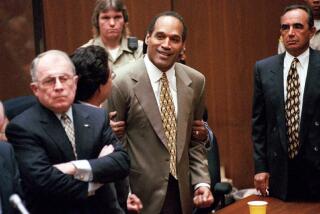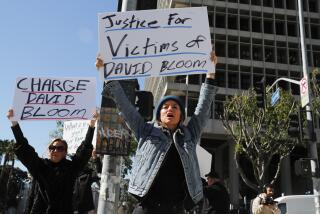Bloom Gets Death Sentence for 2nd Time, After Retrial
VAN NUYS — A judge on Friday sent Robert Bloom Jr. back to death row, where the 37-year-old had spent half his life before his retrial last year for the killings of his father, stepmother and stepsister in Sun Valley.
His lawyers had tried to portray Bloom, who was then 18, as enraged when he shot his abusive father, Robert Bloom Sr., and insane when he later killed his stepmother, Josephine Lou Bloom, and 8-year-old stepsister, Sandra Hughes.
At least that was their strategy until Bloom fired his lawyers in December, after jurors found him guilty of murder in all three slayings. Bloom also withdrew his insanity plea, as jurors were set to consider his mental state.
Neither the jurors nor Los Angeles County Superior Court Judge Darlene Schempp was persuaded by Bloom’s insanity defense.
In affirming the jury verdict Friday, Schempp said Bloom’s crimes were “outrageous” and “cold-blooded.” She cited Bloom’s lack of remorse.
Throughout the hearing, Bloom, dressed in an orange jumpsuit and a purple yarmulke, sat quietly, chained at his feet, chewing on his mouth and rubbing his mustache. Four uniformed deputies watched from around the courtroom.
At first, he seemed confused by Schempp’s reading of the long sentencing form.
When she was done, he asked: “So, what was the sentence?”
Schempp mistakenly answered death without opportunity for parole, and Bloom had to ask whether she had meant life without parole.
As she tried to correct herself, Bloom asked bluntly: “It’s death?”
“Yes,” she said.
“So the verdict is death,” he confirmed, matter-of-factly.
Earlier, Bloom, acting as his own lawyer, asked the court to reduce the jury’s death verdict to life in prison. But Schempp denied the motion.
When she asked Bloom to explain why she should grant his request, he at first declined to respond, saying he couldn’t express himself with his hands shackled. After his handcuffs were removed, Bloom answered simply: “I didn’t do anything wrong.”
He also voiced frustration with the process. “I told the jury the truth and they betrayed me,” he said, adding that the judge should give him some leeway.
This was the second time Bloom was sentenced to death. His 1983 murder convictions were overturned by the U.S. 9th Circuit Court of Appeals in 1997, after it found his trial lawyer had failed to stress his client’s mental condition as part of his defense.
On Friday, Los Angeles County Deputy Dist. Atty. Shellie Samuels urged Schempp to accept the jury’s recommended sentence and impose the death penalty. She described Bloom as “a depraved, self-absorbed sociopath.”
“He is a vicious predator,” she said.
Michael Hughes, the father of the 8-year-old who was stabbed 23 times with scissors and shot in the face, also urged the judge to sentence Bloom to die.
“I want to watch him die,” Hughes said.
His daughter “was very special,” Hughes said, “because she was the only child I could ever father. And he took her away from me.” Hughes has been treated for cancer.
Charles A. Simpson, Josephine Lou Bloom’s uncle and a family spokesman, said he wants Bloom put to death within a year, if not sooner, so his family can have closure.
Bloom’s mother, Melanie Bostic, asked the court to consider her son’s mental condition before sentencing him.
“My son is not a throwaway human being,” she said. “He should be in a mental institution.” She described him as being “like a savant idiot.”
But Bostic’s remarks quickly turned to a rant against the court--she accused the judge of laughing at her son during trial--and against the death penalty.
Schempp said she was not laughing at Bloom but “with him.”
Bostic, who wore a black T-shirt with “I oppose the death penalty” in white letters across the front, was removed from the courtroom by a deputy, after she refused to limit her remarks to her son’s case.
Among the regular family members in attendance was a new face Friday. One of Bloom’s childhood friends, Michael Eugene Carroll, stood at the podium and told the court in a low, sorrowful voice, “I want to say he had a good friend.”
After the hearing, Carroll, with tears in his eyes, sat with Bostic outside the courtroom, looking at old photographs and yearbooks.
More to Read
Sign up for Essential California
The most important California stories and recommendations in your inbox every morning.
You may occasionally receive promotional content from the Los Angeles Times.










